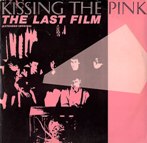When Kissing the Pink hit the chart in 1983 with their catchy song The Last Film, there was confusion over what the name meant, what the full title was and even what the song was about! It was even produced by a man who bluffed his way into the recording industry.
Kissing The Pink were a synth/pop band formed in 1980 in London and comprised lead singer Nick Whitecross, John Kingsley-Hall, George Stewart, Josephine Wells, Pete Barnett and Steve Cusack. Pete, John and George used to practise in a studio in London. The flat above the studio lived Nick and his mum and that’s how Nick was recruited. Nick’s mum was taking an active interest in the band and after she heard Charlie Gillett on the radio advertising for bands to record on a small label, so she promptly sent off a demo tape which then led to a deal with Magnet records.
Their debut single Don’t Hide in the Shadows in 1981 was produced by Martin Hannett whose previous chart successes were Jilted John, John Cooper Clarke’s Gimmix Play Loud and more credibly Joy Division’s Love Will Tear Us Apart. When it came to their debut album, Naked, they told the record company that they wanted Brian Eno to produce it, but Magnet advised them that Colin Thurston (who’d produced Duran Duran’s and Bow wow wow’s first run of hits) would have more impact and be more commercial. Thurston had played in several small bands and bluffed his way into production in the 70s after faking past experience, but he did work on David Bowie’s Heroes album and Iggy Pop’s Lust For Life.
So where did the name come from? When John was asked, he claimed, “It was nothing to do with snooker”. OK, we’ll take it that is a sexual reference then! So how did the song come about? John explained, or tried to! “We’re not sure! It’s confusing because nick wrote the lyrics. I think it’s about a soldier setting off to war (hence the marching drums) and then realises that he’s been fed a constant stream of propaganda.” So what did Nick have to say about it? “I’m not sure whether pop is the right medium for heavy statements” he admitted. “Most of what we do is just a reflection of what we see all around us. The Last Film (or Last Film as it was on the label) is just about a soldier who sat in a tent watching one of those 40s or 50s Hollywood war films just before he’s about to go out and fight for real. It’s not controversial, war is horrible and unglamorous.” He also asserted in 1982 that, “We’ll get it right soon and then we’ll be brilliant.”
John was the resident loon and the most unlikely looking of pop stars who seemingly had no idea of dress sense, mind you, in was the New Romantic era. Just prior to their debut Top Of The Pops appearance John sat in his dressing room in a creased Oxfam jacket, a green tartan kitchen apron over his trousers, odd socks, a pair of Doc Marten Boots and a drawn-on moustache.
The review for the single in Smash Hits stated that it was definitely desirable, not too long and a memorable tune but would stand a better chance of success if the words were clearer. The song reached number 19 in the UK chart, and the band toured the UK extensively to promote the Naked album. “I hope people don’t judge us on the basis of one single,” Nick adds, “I hope they will be pleasantly surprised to hear an album with so much variety on it. If anyone is expecting to hear 12 re-hashes of The Last Film they are going to be disappointed.” Maybe not enough people saw them live as the album petered out at number 54. The album What Noise followed in 1984 but failed to make any impact. In 1985 there was a line-up change and they shortened their name to KTP with little effect. In 1986 released another album called Certain Things Are Likely of which the title track topped the US dance chart and was heard in the 1987 film Can’t Buy Me Love. 1993 saw the released of their final album Sugarland which sank without trace.
They split in 1993, but having tested the dance market with a degree of success Kingsley-Hall, Stewart and Whitecross had one further success in 1994 with the bizarrely titled Twangling Three Fingers in a Box under the moniker Mike which peaked at number 40. In 2003 the trio made an album with Dutch jazz saxophonist Candy Dulfer and in 2007 contributed three tracks to Gareth Gates’ album Pictures On The Other Side including the Top 20 hit Changes. More recently they have been working with Rob Harvey from The Music and for the last two years they been busy writing new material in their own London studio.
In 1989 Jo Wells was a guest at her cousin’s birthday party aboard the Marchioness when it hit a barge and crashed killing 51 people. She was plunged into the freezing cold River Thames and was under water for three minutes. It was only her skill as a sax player and knew how to do the right breathing exercises that saved her life. She thought she was about to die, but surfaced suddenly and emerged from the river with only minor physical injuries. But Wells had endured seven years of trauma. Since the night she has lost the control of her lip that is essential to players of brass instruments. She is now unable to work, has sold two of her saxophones, and lives on income support.
